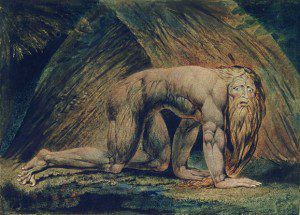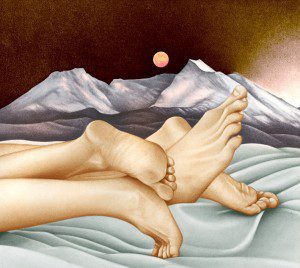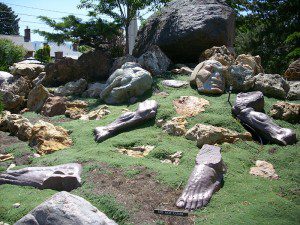
Nebuchadnezzar II was the warrior-king of Babylon who laid waste to Jerusalem, destroyed Solomon’s Temple, and deported the Jews of Palestine into exile. An intriguing episode from Nebuchadnezzar’s reign (605-562 BCE) provides a window into an ancient way of dreaming. The central character in the story is Daniel, and its only source is the book of the Tanakh, or Old Testament, named after him.
Daniel was taken toBabylonas a child, and was one of the boys selected by the chef eunuch, at the king’s direction, to be taught to read and write in the Chaldean language and to be educated as a “tablet-knowing scribe” in the royal service. This would necessarily have involved becoming conversant with Mesopotamian modes of dreaming and divination; books on these subjects, preserved on clay tablets, were a main feature of royal libraries. The very word “Chaldean” was a synonym for “diviner”. Daniel was given a pagan Chaldean name – Belteshazzar – but succeeded in maintaining a kosher diet, according to his chronicler.
Daniel was presented to Nebuchadnezzar while still a student, and soon became a trusted counselor, along with his three friends Hananiah, Mishael and Azariah (better remembered by their Chaldean names Shadrach, Meshach and Abed-nego). “They became members of the king’s court, and on whatever point of wisdom or understanding he might question them, he found them ten times better than all the magicians and soothsayers in his entire kingdom.” [Daniel 1:19-20 NJB]
In the second year of his reign, Nebuchadnezzar was troubled by disturbing dreams. He summoned the chief diviners and told them he wanted them to explain a dream. Naturally, they asked the king to tell his dream. The king’s response was extraordinary. He expected the diviners to tell him the dream that troubled him. His challenge was fierce: “If you cannot tell me what I dreamed and what it means, I shall have you torn limb from limb and your houses turned into dunghills.” [Daniel 2:5 NJB] When the magicians begged him to reveal his dream, the king barked, “Tell me what my dream was, and then I shall know whether you can interpret it.” [Dan 2:9 NJB] The diviners were stumped, complaining that what the king is asking is something beyond mortal skill. He flew into a rage and decreed that “all the Babylonian sages” will be put to death. The names of Daniel and his friends were on the list.
When Daniel heard about the death order, he went to meet death on the road. He intercepted the high executioner, Arioch, and learned from him about the dream challenge. He then went to the king to request a stay of execution; he would use this to retrieve the king’s dream and its correct interpretation. That night, he asked his friends to invoke the support of “the God of heaven” to help him in his quest for the secret of Nebuchadnezzar’s dream. “The mystery was then revealed to Daniel in a night vision” [Dan2:19].
Daniel returned to the palace. Facing the king, Daniel described “the dreams and the visions that passed through your head as you lay in bed” in vivid detail.
Daniel described how the king’s thoughts had turned to the future and the “Revealer of Mysteries” had given him a vision of “what is to take place in the final days.” In the vision, the king saw a composite statue, blazingly bright. The head was of shining gold, the chest and arms were silver, the belly and thighs were bronze, the legs iron, and the feet were part iron and part clay. As the king watched, a stone flew through the air, untouched by any hand, and shattered the statue’s feet. Then all the parts of the statue broke into pieces, “as fine as the chaff on the threshing-floor” and the wind blew them away. The stone grew into a great mountain, filling the whole world. [Dan 2:31-36]
Daniel explained how the dream foretold the rise and fall of empires. After Nebuchadnezzar (the golden head) would come a lesser kingdom, then a third, of bronze and a fourth hard as iron. The fifth empire, of iron and clay, would be “partly strong and partly brittle”, weakened by its divisions. Then the God of heaven would shatter all that came before and establish a new order, solid as the world-mountain.
According to the author of the Book of Daniel, Nebuchadnezzar was so impressed by all this he threw himself at Daniel’s feet, offered him “fragrant sacrifice”, and appointed him governor of the province and “head of all the sages ofBabylon”. Although Nebuchadnezzar later went mad and lived as a wild beast – a madness brilliantly evoked in a painting by William Blake – it is doubtful that he was ever mad enough to prostrate himself before a palace servant.
Next: Daniel, an active dreamer in the Bible
Adapted from The Secret History of Dreaming by Robert Moss. Published by New World Library.

